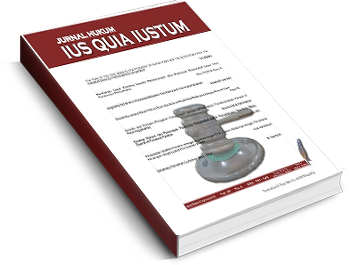Main Article Content
Abstract
Political party and corruption in Indonesia can be allegorized as two sides of a coin, both of which relate closely to each other. Law No. 2 of 2008 in conjunction with Law No. 2 of 2011 on Political Party mentions one of the reasons of the political party dismissal, namely conducting an activity which violates the regulations of law. The proposition to dismiss a political party comes only from the Government. This fact closes the opportunity of other parties like individual or community group to propose a political party dismissal. The problems studied in this research are: First, the reason why an individual or a community group should be given the legal standing in the proposition of the political party dismissal. Second, the relevance of the legal standing provision to an individual or a community group in the proposition of the political party dismissal. Third, what attempt that can be conducted to provide the legal standing for an individual or a community group in the proposition of the political party dismissal. The method used in this research is normative juridical method employing law material approach. The result of the research concludes that: First, the urgency to provide the legal standing for an individual or a community group in the proposition of the political party dismissal to interpret the implementation of the people sovereignty in the law state principle. Second, by the provision of legal standing for an individual or a community group, the citizen monitoring toward the political parties will be more effective. Third, the attempt that can be conducted to provide legal standing for an individual or a community group in the provision of the political party dismissal is by revising the Constitutional Court Law.
Keywords
Article Details
Authors who publish with this journal agree to the following terms:
a. Authors retain copyright and grant the journal right of first publication with the work simultaneously licensed under a Creative Commons Attribution License that allows others to share the work with an acknowledgement of the work's authorship and initial publication in this journal.
b. Authors are able to enter into separate, additional contractual arrangements for the non-exclusive distribution of the journal's published version of the work (e.g., post it to an institutional repository or publish it in a book), with an acknowledgement of its initial publication in this journal.




